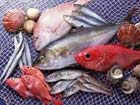| Videos | • Latest |
|
• Feature | • Sports | • Your Videos |
Seafood sales drop in Shanghai

With Japan's nuclear crisis ongoing, sales of vegetables and meat has remained stable, while seafood from Chinese regions around the East Sea have dropped. But authorities say extremely low levels of radioactive iodine has only been detected in the air in these regions, and has not affected the food or seafood supply.
According to industry insiders, about 70 percent of vegetables sold in Shanghai's local markets are from its surrounding suburbs, as well as adjacent Jiangsu and Zhejiang provinces -- regions along the coast of the East Sea.
Market vendors say they have not been notified of any ban on the sales of frozen seafood coming from the costal regions, and their prices remain stable.
Gu Yaofeng, Local Wholesale Market said "Frozen seafood sold in our market is mainly from provinces near the East Sea and the South Sea. Now the fish prices are relatively stable, and sales are also at reasonable levels."
Wholesalers say sales of vegetables and meat are nearly the same as last week, while sales of frozen seafood have dropped by about 30 percent.
The Shanghai authorities say the waters off the East coast and costal soils have not been affected by Japan's nuclear pollution. But they say they WILL beef up inspection of foods imported from Japan, and continue to monitor local food and drinking water for radiation levels.
 0
0 







Go to Forum >>0 Comments